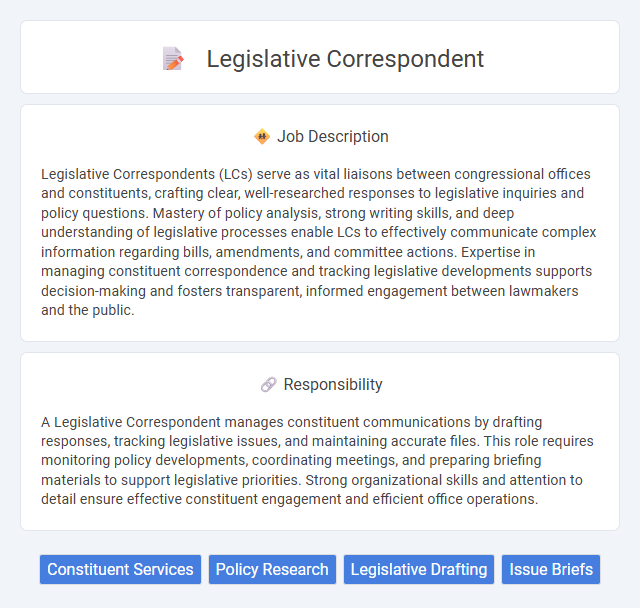
Legislative Correspondents (LCs) serve as vital liaisons between congressional offices and constituents, crafting clear, well-researched responses to legislative inquiries and policy questions. Mastery of policy analysis, strong writing skills, and deep understanding of legislative processes enable LCs to effectively communicate complex information regarding bills, amendments, and committee actions. Expertise in managing constituent correspondence and tracking legislative developments supports decision-making and fosters transparent, informed engagement between lawmakers and the public.
Individuals who possess strong communication skills, attention to detail, and an interest in politics or public policy are likely to find the Legislative Correspondent role suitable. This position often involves managing high volumes of correspondence and requires the ability to synthesize complex information clearly and efficiently. People who thrive in fast-paced environments and demonstrate empathy in constituent interactions may have a higher probability of success in this job.
Qualification
A Legislative Correspondent typically requires a bachelor's degree in political science, communications, or a related field, alongside strong research and writing skills tailored to legislative issues. Proficiency in drafting constituent correspondence, analyzing policy documents, and managing communications for elected officials is essential. Experience in government, internships on Capitol Hill, or familiarity with legislative procedures significantly enhances job qualifications.
Responsibility
A Legislative Correspondent manages constituent communications by drafting responses, tracking legislative issues, and maintaining accurate files. This role requires monitoring policy developments, coordinating meetings, and preparing briefing materials to support legislative priorities. Strong organizational skills and attention to detail ensure effective constituent engagement and efficient office operations.
Benefit
The Legislative Correspondent role likely offers significant benefits such as gaining in-depth knowledge of legislative processes and enhancing communication skills through direct interaction with lawmakers and constituents. Employees in this position probably receive access to valuable professional networks and opportunities for career advancement within government or policy-related fields. This job may also provide a stable work environment with competitive compensation and potential health and retirement benefits.
Challenge
A Legislative Correspondent job likely involves managing high volumes of constituent communications, requiring strong organizational skills and the ability to prioritize effectively under pressure. The role may demand a deep understanding of legislative processes and quick adaptation to rapidly changing political climates. Challenges probably include balancing attention to detail with timely responses to ensure constituents feel heard and represented.
Career Advancement
A Legislative Correspondent role offers a critical foundation for understanding policymaking and constituent communication within government offices. Mastery in drafting legislative materials and managing correspondence enhances skills vital for progressing to Legislative Assistant or Senior Advisor positions. This career path provides strategic opportunities to influence policy development and build networks essential for long-term advancement in public service.
Key Terms
Constituent Services
Legislative Correspondents play a crucial role in managing constituent services by effectively addressing and resolving inquiries, concerns, and requests from the public. They draft clear, informative responses that communicate legislative updates, policy positions, and resources to constituents. Expertise in federal and state legislative processes enables them to guide constituents through complex government procedures, enhancing community engagement and satisfaction.
Policy Research
Legislative Correspondents play a crucial role in policy research by analyzing legislative proposals, tracking policy developments, and preparing briefings for lawmakers. Their work involves synthesizing complex information from government reports, stakeholder communications, and legal texts to support informed decision-making. Proficiency in research methodologies and familiarity with legislative processes are essential to effectively advise on policy impacts and constituent concerns.
Legislative Drafting
Legislative Correspondents play a crucial role in legislative drafting by researching, analyzing, and preparing detailed documents that support lawmakers in formulating policies and bills. Their expertise in interpreting legal language and ensuring clarity helps create precise and effective legislative texts. Proficiency in policy analysis and constituent communication enhances the drafting process, making the correspondence an essential link between lawmakers and their legislative agenda.
Issue Briefs
Legislative Correspondents play a crucial role in drafting clear, concise issue briefs that summarize policy positions and legislative developments for congressional offices. These briefs provide lawmakers with essential background information and up-to-date facts, enabling informed decision-making and effective constituent communication. Mastery in research, writing, and understanding legislative processes is essential for producing accurate and impactful issue briefs.
 kuljobs.com
kuljobs.com